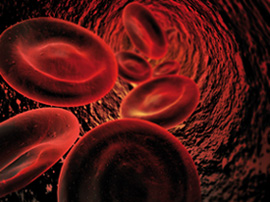Blood cell breakthrough could help save lives
Release Date 07 October 2013

Cutting-edge research from the University of Reading has provided a crucial breakthrough in understanding how blood clots form. The results of the study, funded by the British Heart Foundation (BHF), could potentially lead to the development of new drugs to treat one of the world's biggest killer illnesses.
Cardiovascular diseases, which include heart attacks, strokes and heart failure, are the cause of approximately 200,000 deaths each year in the UK alone. Many are brought about by clots blocking major blood vessels, preventing critical blood flow to the heart or brain.
The research¹, published today in the journal Nature Communications, builds on last year's groundbreaking discovery by scientists in the University's Institute for Cardiovascular and Metabolic Research (ICMR). Professor Jonathan Gibbins and his team found, for the first time, the mechanism by which platelets, the blood cells that cause clots, ‘communicate' with each other.
The clotting process helps the body to repair itself and stops wounds from bleeding. But inappropriate activation of platelets leads to the formation of clots in the bloodstream (thrombosis), which can lead to a potentially fatal heart attack or stroke.
Currently, doctors treating heart disease can administer drugs that reduce the tendency of the blood to clot, and therefore decrease the risk of thrombosis. However, such anti-thrombotic drugs are not effective for some patients, and can cause dangerous side-effects which include bleeding.
Professor Jonathan Gibbins and Dr Sakthivel Vaiyapuri have headed up an international team of researchers that have discovered how platelets use specialised pore-like structures, called gap junctions, allowing direct communication between the cells. These structures have been studied previously in other cells that are in constant contact with each other, but the researchers said their role in platelets was a ‘big surprise'.
The scientists conclude that the discovery could lead to the creation of innovative new drugs to prevent or treat thrombosis.
Professor Gibbins said: "Understanding the communication mechanism for blood clotting and thrombosis could lead to life-saving new drugs. Finding the molecules that control these channels may pave the way for the development of more effective anti-thrombotic therapies to prevent heart attacks and strokes."
Professor Jeremy Pearson, Associate Medical Director at the BHF, which funded the study, said:
"Anti-clotting medicines are widely used in patients at risk of coronary heart disease to prevent heart attacks and strokes. Professor Gibbins' unexpected discovery, of a new communication method between the clot-forming platelet cells, opens up the possibility of designing new medicines to reduce the risk of clotting or thrombosis. Before we can achieve this, more research is needed to understand what signals occur during this communication and how it controls the platelet's ability to clot."
ENDS
For media enquiries please contact James Barr at the University of Reading on 0118 378 7115 or j.w.barr@reading.ac.uk
Notes to editors:
Connexin40 Regulates Platelet Function is published in the journal Nature Communications
¹The 2012 study focused on the function of a protein known as Connexin 37 (Cx37) and its ability to enable direct communication between platelets when the blood clots after injury. Using a range of approaches the researchers established that the role of Cx's in platelets involves multiple family members. They also discovered that different Cx's are able to work independently for their key roles in these cells. This establishes the wide importance of this new process in blood clotting and thrombotic disease.
The University of Reading is ranked among the top 1% of universities globally (THE World University Rankings 2012-13) and is among the top 20 universities in the UK for research funding.
The Institute for Cardiovascular and Metabolic Research (ICMR) at the University of Reading is a multidisciplinary centre bringing together scientists from a wide range of research fields to work to understand the development of cardiovascular diseases, and the underlying obesity-related metabolic diseases from which they develop. Cardiovascular diseases, which include heart attacks, strokes and heart failure, are the cause of approximately 200,000 deaths each year in the UK alone, with similar incidence rates across Europe, and North America, and are becoming an increasing burden in rapidly developing nations.
British Heart Foundation - Coronary heart disease is the UK's single biggest killer. For over 50 years we've pioneered research that's transformed the lives of people living with heart and circulatory conditions. Our work has been central to the discoveries of vital treatments that are changing the fight against heart disease. But so many people still need our help. From babies born with life-threatening heart problems to the many Mums, Dads and Grandparents who survive a heart attack and endure the daily battles of heart failure. Every pound raised, minute of your time and donation to our shops will help make a difference to people's lives.
